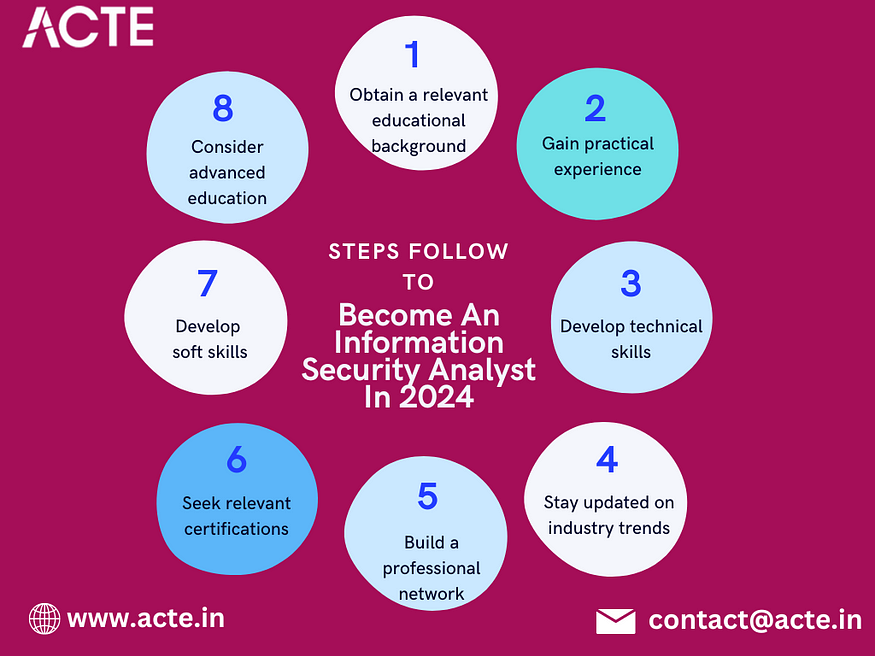In today’s digital age, ensuring the security of information has become crucial for organizations across the globe. As a result, the demand for skilled information security analysts is on the rise. If you’re interested in pursuing a career in this exciting field in 2024, this step-by-step guide will provide you with a roadmap to becoming an information security analyst.
Learning Ethical Hacking is a deliberate decision with long-term implications for your career advancement and professional development. With Ethical Hacking training in Chennai, professionals can gain the skills and knowledge needed to harness the capabilities of hacking for diverse applications and industries.

Steps Follow To Become An Information Security Analyst In 2024:
Step 1: Obtain a Relevant Degree
To embark on the path of becoming an information security analyst, it is advisable to earn a bachelor’s degree in a field related to information technology, cybersecurity, computer science, or a similar discipline. Look for reputable universities or colleges that offer specialized programs in cybersecurity or information security. Ensure that the curriculum covers topics such as network security, security management, computer forensics, and ethical hacking.
Step 2: Gain Practical Experience
While earning a degree is essential, it is equally important to gain practical experience in the field. Seek internships, part-time positions, or volunteer opportunities related to information security. This will allow you to apply your theoretical knowledge in real-world scenarios and develop practical skills. You can also consider participating in cybersecurity competitions or joining relevant clubs and organizations to enhance your skills and network with professionals in the industry.
Step 3: Obtain Relevant Certifications
Certifications play a vital role in the information security field, demonstrating your expertise and commitment to the industry. Some widely recognized certifications for information security analysts include:
- CompTIA Security+: Provides a solid foundation in cybersecurity concepts and best practices.
- Certified Information Systems Security Professional (CISSP): Demonstrates advanced knowledge and skills in various security domains.
- Certified Ethical Hacker (CEH): Focuses on ethical hacking techniques and tools.
- Certified Information Security Manager (CISM): Emphasizes information security management and governance.
Research the certifications that align with your career goals and start working towards obtaining them. They will not only enhance your knowledge but also make your resume more attractive to potential employers.
Step 4: Develop Technical Skills
Information security analysts require a strong technical skill set to effectively protect organizations’ data and systems. Some key technical skills to focus on include:
- Network security: Understand network protocols, firewalls, intrusion detection systems, and virtual private networks (VPNs).
- Vulnerability assessment and penetration testing: Learn how to identify vulnerabilities and perform security assessments.
- Security tools: Familiarize yourself with popular security tools such as antivirus software, intrusion detection systems, and log analysis tools.
- Incident response: Gain knowledge of incident response procedures and how to handle security incidents effectively.

To learn the particulars of hacking and unleash its full potential, individuals can benefit from enrolling in the Best Ethical Hacking Online Training.
Stay updated with the latest trends and advancements in the field by attending industry conferences, participating in webinars, and joining relevant online communities.
Step 5: Stay Informed about Industry Regulations and Best Practices
Information security analysts must keep up with evolving industry regulations and best practices. Stay informed about frameworks such as the National Institute of Standards and Technology (NIST) Cybersecurity Framework and the General Data Protection Regulation (GDPR). Familiarize yourself with best practices for securing different technologies and systems, as well as emerging threats and attack vectors.
Step 6: Build a Professional Network
Networking plays a crucial role in any career, including information security. Join professional organizations, attend local meetups, and participate in online forums to connect with professionals in the industry. Networking can provide valuable insights, mentorship opportunities, and potential job leads.
Step 7: Apply for Entry-Level Positions
Once you have acquired the necessary education, certifications, and practical experience, it’s time to start applying for entry-level positions as an information security analyst. Look for job openings at organizations that value cybersecurity and have dedicated security teams. Tailor your resume and cover letter to highlight your relevant skills and experiences.
Step 8: Continuing Education and Professional Development
The field of information security is constantly evolving, so it’s important to continue learning and developing your skills. Stay updated with the latest cybersecurity news, attend training programs and workshops, and pursue advanced certifications as you progress in your career.
Becoming an information security analyst requires dedication, continuous learning, and a passion for protecting digital assets. By following this step-by-step guide, you can lay a solid foundation for a successful career in information security in 2024.
Remember to stay proactive, adaptable, and passionate about staying ahead of emerging threats and technologies to excel in this dynamic field.

No comments yet